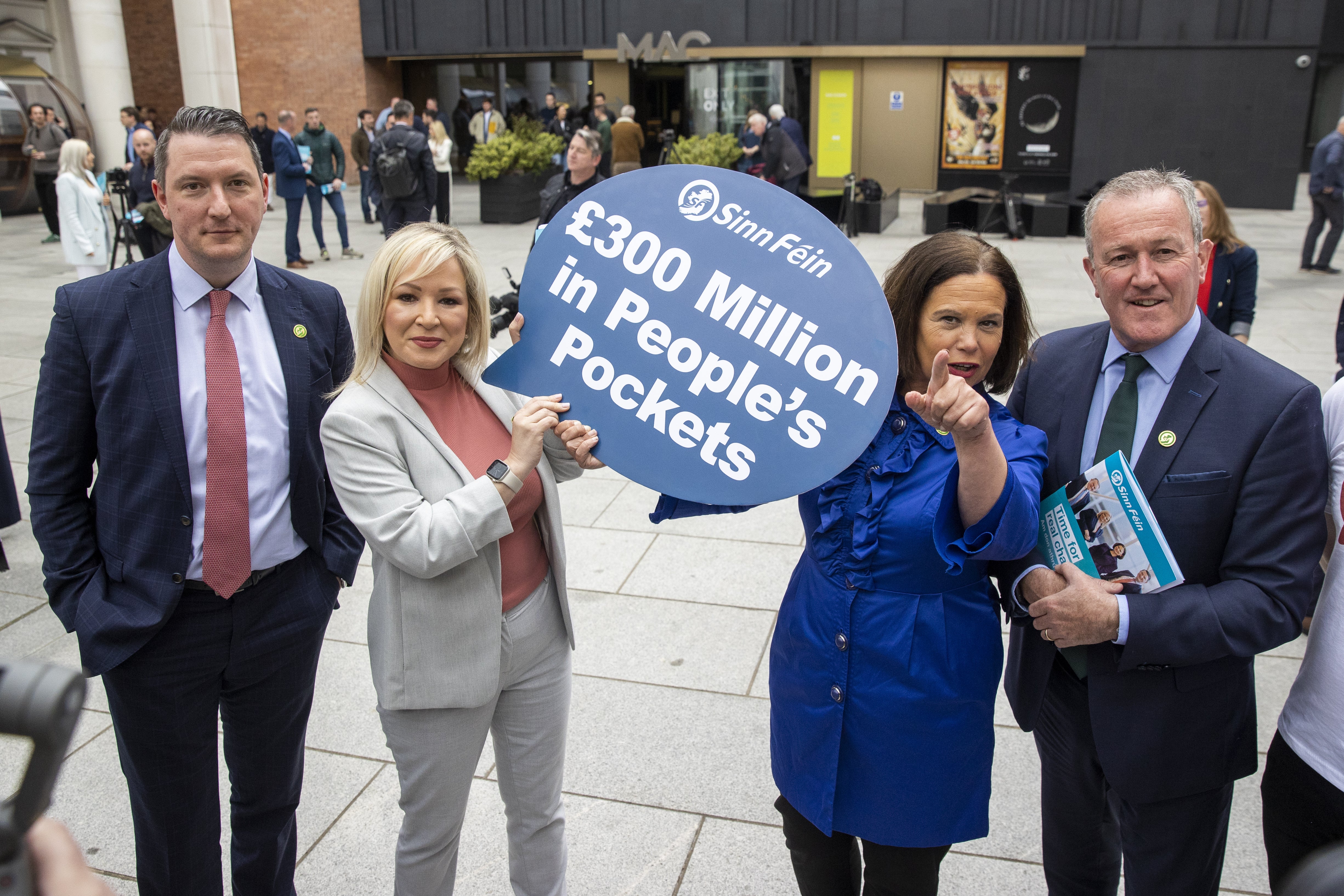Sinn Fein ‘striking balance between unity push and bread-and-butter issues’
Party president Mary Lou McDonald joined colleagues to launch Sinn Fein’s Assembly election manifesto in Belfast.

Sinn Fein wants to strike a balance between its aspiration for Irish unity and tackling the real life concerns of people, Mary Lou McDonald has said.
The party president insisted the process of planning for unification, through the establishment of an all-island citizens’ assembly, could continue alongside efforts to deal with bread-and-butter issues, such as rocketing living costs and spiralling health service waiting lists.
Mrs McDonald was commenting as she joined senior party colleagues in Belfast to launch Sinn Fein’s manifesto for the forthcoming Assembly election in Northern Ireland.
The document includes a pledge to pay £230 to every household in the region to help mitigate some of the pressure of rising energy bills.
Another manifesto priority is securing a date for a border poll on unification.
Mrs McDonald declined to be drawn on a specific timeline for holding referenda on both sides of the border but predicted “significant change will happen in the course of this decade”.
“We are Irish republicans, people know our position in respect of Irish reunification and referendums,” she added.
“There’s no secret about that, but we know that you can push for that, plan for that, but also work very constructively and not just work constructively, but deliver for people and everybody in the here and now.
“And there has to be a balance struck between those two things and our campaign is fashioned to recognise those bread and butter, lived realities of people.”
Mrs McDonald said planning for unity “does not mean that you suspend everything else”.
“Everybody here will tell you out on the doors the question for people is how do I make my electricity bill, how do I ensure that we can just keep things going and in many, many households keep our heads above water, and that includes working families.
“So, we need to manage all of the above and the Assembly and the Executive have to be constructive, partnership-based platforms to discuss, to debate and to plan for that future and, yes, referendums will feature of course, they’re part and parcel of the Good Friday Agreement, which will be 25 years old next year.”
The DUP has claimed Sinn Fein will be emboldened to press for a referendum if it displaces the DUP as the largest party following the May 5 election.
DUP leader Sir Jeffrey Donaldson has insisted a “divisive border poll” is the republican party’s sole focus, to the detriment of all other issues.
Unionist rivals have accused him of trying to scare the unionist electorate into voting DUP to consolidate his party’s support in the wake of a series of opinion polls that have indicated it is trailing behind Sinn Fein.
While a page of the Sinn Fein manifesto is dedicated to planning for unity, it was not one of the issues the party chose to focus on as it unveiled the document on Monday morning.
However, Mrs McDonald and vice president Michelle O’Neill faced a series of media questions on the issue after the launch.
The party leader rejected the suggestion that the party was deliberately placing less emphasis on unification as a way to blunt the DUP campaign strategy.
She also denied a border poll would be “divisive”.
“As people who believe in the future of this country, we will always set out a position that a united Ireland or a new Ireland works for everybody, can work for everybody,” she said.
“It’s not divisive, as a matter of fact the proposition is a very inclusive one.”
As well as the £230 for every household, a scheme that would cost £177 million, Sinn Fein also pledges to give an extra £100 to benefit recipients who were previously eligible for Stormont’s Energy Support Scheme.
The party also said it would support diverting an extra £1 billion into the region’s under-pressure health service.
Sinn Fein also criticised the DUP’s stewardship of the Department of Economy and said more needed to be done to promote what it described as the benefit of the provision within Brexit’s Northern Ireland Protocol that allows local businesses to sell without restriction within the UK market and EU single market.
Commenting on the manifesto’s pledges on unity, Ms O’Neill said “that’s who we are”.
She added: “But we also focused on all the other issues which we know are weighing heavily on people’s minds.
“That is the cost-of-living crisis, that is how we’re going to put money in people’s pockets, that is how we’re going to try and fix the health service which is broken, not just by the pandemic but by 10 years of Tory austerity in advance of that. And we have huge work to do.
“So, the only way we’re going to be able to turn that tanker around, particularly in relation to the health service, is if all the parties work together.
“We’re committed to doing that. That’s why we say on day one, immediately after this election, when the public have their say, we will turn up and we ask others to turn up and we ask others to join with us in trying to fix the things that are broken for our society right now.”
The DUP collapsed the Stormont Executive in February when it withdrew first minister Paul Givan in protest at the protocol.
Sir Jeffrey has warned that his party will not return to a powersharing administration post-election until the protocol is replaced, either by way of an agreed settlement with the EU or by the UK Government acting unilaterally to suspend it.